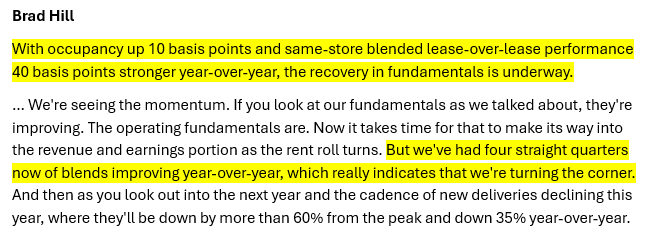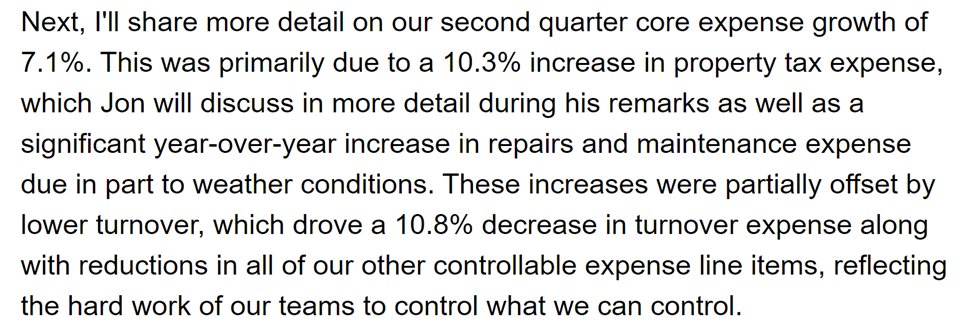
Rental housing economist, Dad x5 and suffering Cowboys fan ... Rental housing is essential, misunderstood and we need more of it.
How to get URL link on X (Twitter) App


 2) MAA highlighted improvement in two key markets -- Atlanta and Dallas. But also noted Austin (highest supplied major market) "continues to be our weakest market in terms of pricing."
2) MAA highlighted improvement in two key markets -- Atlanta and Dallas. But also noted Austin (highest supplied major market) "continues to be our weakest market in terms of pricing." 

 1) Eviction mitigation policies -- i.e. "just cause eviction" and "right-to-counsel" -- drive up rents by 6.5% on average, according to the authors' analysis using Census ACS data.
1) Eviction mitigation policies -- i.e. "just cause eviction" and "right-to-counsel" -- drive up rents by 6.5% on average, according to the authors' analysis using Census ACS data. 

 1b) REITs represent a very small share of U.S. apartment construction, yet have big advantage over most builders in that they have lower capital costs -- so AVB and its peers want to build while most others can't, and deliver those units into lower-supply years of 2026-27.
1b) REITs represent a very small share of U.S. apartment construction, yet have big advantage over most builders in that they have lower capital costs -- so AVB and its peers want to build while most others can't, and deliver those units into lower-supply years of 2026-27.

 2) Camden likened 2025 to the post-GFC recovery era in early 2010s -- when Camden (and others) started buying and building again. One big priority: Recycle capital, which means selling older properties and buying/building newer ones.
2) Camden likened 2025 to the post-GFC recovery era in early 2010s -- when Camden (and others) started buying and building again. One big priority: Recycle capital, which means selling older properties and buying/building newer ones. 

 2) High occupancy rates has helped improve pricing power. Sending out renewal offer letters at ~7%, expecting around 5% renewal rent growth.
2) High occupancy rates has helped improve pricing power. Sending out renewal offer letters at ~7%, expecting around 5% renewal rent growth.

 Well, some people might point to the job market. Denver has shown some odd job numbers, dipping slightly negative on year-over-year job change in the summer. But it's probably not that simple for a couple reasons...
Well, some people might point to the job market. Denver has shown some odd job numbers, dipping slightly negative on year-over-year job change in the summer. But it's probably not that simple for a couple reasons...

 First, let's talk about "fancy apartments."
First, let's talk about "fancy apartments."

 2) That said, Camden plans to start 2-3 projects next year (Denver and Nashville) that still work.
2) That said, Camden plans to start 2-3 projects next year (Denver and Nashville) that still work.

 2) Apartment developers say new projects do not pencil out. Industry survey blames delayed starts on "economic uncertainty" (92%) and "project is not economically feasible" (67%)-- meaning they can't get rents needed to justify costs of construction.
2) Apartment developers say new projects do not pencil out. Industry survey blames delayed starts on "economic uncertainty" (92%) and "project is not economically feasible" (67%)-- meaning they can't get rents needed to justify costs of construction. 

 2) As Bloomberg points out, the share is larger in markets like Atlanta and Memphis.
2) As Bloomberg points out, the share is larger in markets like Atlanta and Memphis.
 2) Like others, Camden reported that market-rate rental affordability (at least the A/B market where REITs and institutions operate) has materially improved, with a rent-to-income ratio of 19%.
2) Like others, Camden reported that market-rate rental affordability (at least the A/B market where REITs and institutions operate) has materially improved, with a rent-to-income ratio of 19%. 

 2) But of course, there's even more supply than demand -- especially in the Sun Belt. Supply levels are at record highs (or at least multi-decade highs) nearly everywhere.
2) But of course, there's even more supply than demand -- especially in the Sun Belt. Supply levels are at record highs (or at least multi-decade highs) nearly everywhere.

 2) Move-outs due to rent increase remain below normal (16% vs. 20%), but EQR did see an uptick of move-outs for affordability reasons in parts of SoCal.
2) Move-outs due to rent increase remain below normal (16% vs. 20%), but EQR did see an uptick of move-outs for affordability reasons in parts of SoCal. 

 2) Resident turnover is declining not only b/c of low move-outs-to-purchase, but also b/c of improved "bad debt lease compliance" -- which means many long-term nonpayers from COVID era have moved out and now a higher share of residents paying rent each month.
2) Resident turnover is declining not only b/c of low move-outs-to-purchase, but also b/c of improved "bad debt lease compliance" -- which means many long-term nonpayers from COVID era have moved out and now a higher share of residents paying rent each month. 

 It’s a profile of WinnCompanies, which manages 100k+ units. In 2018, Winn sought to cut evictions by 50% and partnered with a notable tenant rights attorney to find a way to do it.
It’s a profile of WinnCompanies, which manages 100k+ units. In 2018, Winn sought to cut evictions by 50% and partnered with a notable tenant rights attorney to find a way to do it.


 Here's the month-over-month change in CPI's rent of primary residence -- lowest since Dec 2021. Remember that rent is the most important variable in shelter... even OER (while weighted heavier) is using this exact same survey of renters.
Here's the month-over-month change in CPI's rent of primary residence -- lowest since Dec 2021. Remember that rent is the most important variable in shelter... even OER (while weighted heavier) is using this exact same survey of renters. 

 Apartment rents did increase in May, yes, but at the lowest level in more than a decade outside of the pandemic lockdown period of May 2020.
Apartment rents did increase in May, yes, but at the lowest level in more than a decade outside of the pandemic lockdown period of May 2020.


 Market-rate apartments are basically full with renters spending, at median, 23% of income on rent. That isn't the big problem.
Market-rate apartments are basically full with renters spending, at median, 23% of income on rent. That isn't the big problem.
 Here's one that is far less surprising. Salt Lake City is hoppin.
Here's one that is far less surprising. Salt Lake City is hoppin. 